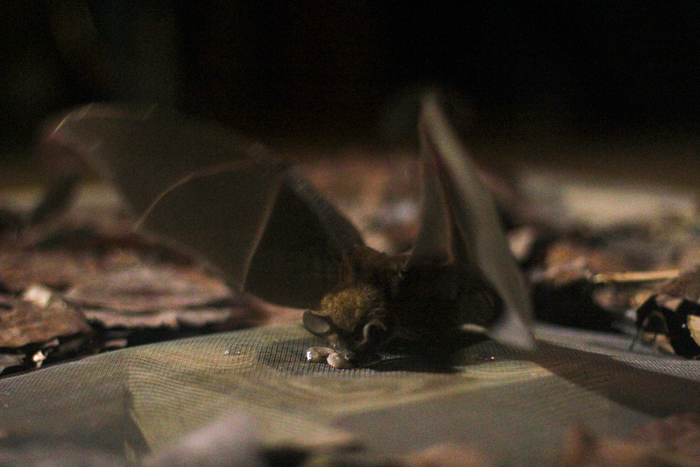There are certain skills that once we acquire them, we rarely have to relearn them, like riding a bike or looking both ways before crossing a street. Most studies on learning and long-term memory in the wild focus on a handful of animal species. Now, in a publication in Current Biology, researchers working at the Smithsonian Tropical Research Institute (STRI) share the first report of long-term memory in frog-eating bats (Trachops cirrhosus).

Credit: Andrew Quitmeyer
There are certain skills that once we acquire them, we rarely have to relearn them, like riding a bike or looking both ways before crossing a street. Most studies on learning and long-term memory in the wild focus on a handful of animal species. Now, in a publication in Current Biology, researchers working at the Smithsonian Tropical Research Institute (STRI) share the first report of long-term memory in frog-eating bats (Trachops cirrhosus).
“Frog-eating bats are an excellent emerging model organism for studying cognitive and sensory ecology,” explains biologist M. May Dixon, lead author of the paper, who just finished her doctoral degree at the University of Texas at Austin, “learning plays a big part in their lives.”
The bats’ ability to learn and retain information means that when they are hunting frogs, their main prey, they don’t have to continuously relearn which frog calls indicate that a frog is good to eat, poisonous, or too big to carry.
Dixon and colleagues trained 49 wild bats to respond to cellphone ringtones played through speakers. Bats responding to two of the tones found a bait fish reward on the speaker every time, but when they responded to three other tones, they were never rewarded. They quickly learned to fly to the speaker when ringtones indicated a snack, and not to respond to the other tones. The bats were then microchipped and released back into Panama’s Soberania National Park.
Researchers recaptured eight trained bats between one to four years later, and when they played the experimental sounds again, the bats recognized and responded to the two rewarded ringtones even four years later. For comparison, the experiment included 17 untrained frog-eating bats that usually twitched their ears attentively but did not fly to the sounds.
When Dixon was working as a STRI intern with PhD student and co-author Patricia Jones to find out if the bats could learn which novel tones meant a reward by watching the responses of other bats, she realized that she could also find out if the bats could remember the tones.
The ringtones they chose for the experiments, the ping of an incoming text message alert, and the beep of a car being unlocked, sounded clearly human-generated, so that the bats wouldn’t casually hear them in nature, but frog-like enough that the bats were interested.
As for the extinguished tones, the unrewarded ones that the bats learned to disregard, researchers played one of them to the recaptured bats, and six of the eight trained bats approached it.
“It’s possible that they remember the extinguished sound, but enough time had gone by that they thought to check it out once more,” said Dixon. “Or it’s possible that they couldn’t remember the exact difference between the ringtones, and that extinguished sound was close enough to the rewarded one that they decided to check that out too. Sort of like a generalization of memory.”
To make sure that the bats were not responding to every sound they heard, she played a pure tone, and most of the bats did not fly to it, only twitched their ears.
This experiment raises more questions regarding how memory works in these bats and other animals, including the metabolic cost of remembering.
“I’m interested in memory capacity in animals and what causes long-term or short-term memories, what ecological conditions select for different memory lengths, what is important to remember and to forget,” she explains. “But studying long-term memory is very difficult, because it takes a long time by definition. And testing memory in captive animals, even if it’s more convenient, isn’t necessarily representative of what animals can remember in the wild.” She wants to go back to the BatLab, directed by STRI staff scientist and co-author Rachel Page, to learn more.
“STRI has been the basis for so much research done with bats. They have gathered a large database on frog-eating bats, on experiments done with bats, what stimulus have been used, so if you capture a bat that has been caught before, you already have its whole history. There are few places in the world where you can have that amount of detail,” she says. “I went from liking bats but not thinking they were very interesting, to realizing they are very complex little creatures, with deep personalities and very engaging ways of interacting with the world.”
The Smithsonian Tropical Research Institute, headquartered in Panama City, Panama, is a unit of the Smithsonian Institution. The institute furthers the understanding of tropical biodiversity and its importance to human welfare, trains students to conduct research in the tropics and promotes conservation by increasing public awareness of the beauty and importance of tropical ecosystems. Promo video.
Journal
Current Biology
DOI
10.1016/j.cub.2022.05.031
Article Title
Long-term memory in frog-eating bats
Article Publication Date
20-Jun-2022




